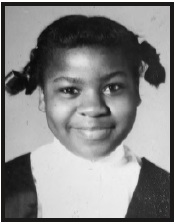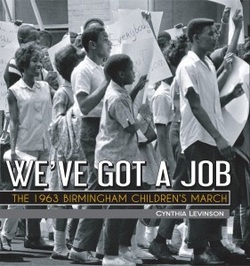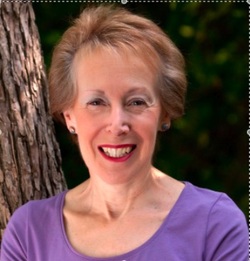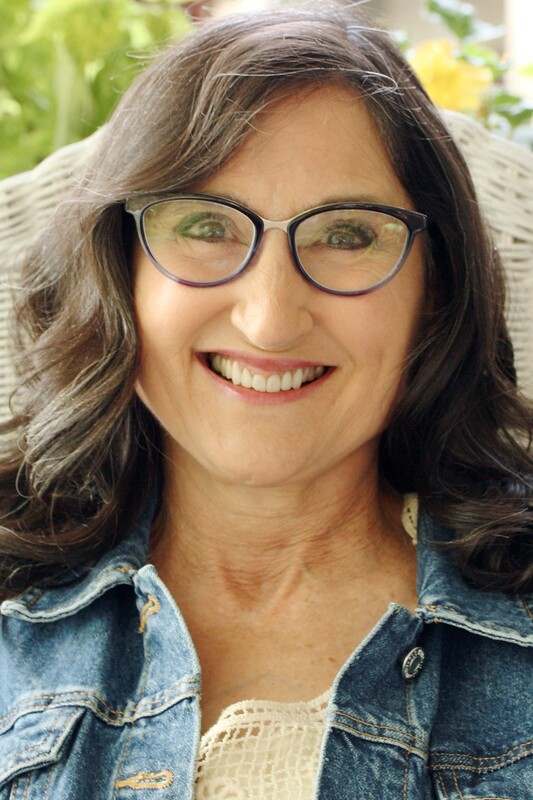 Audrey Faye Hendricks Audrey Faye Hendricks On Thursday morning, May 2, 1963, nine-year-old Audrey Faye Hendricks woke up with freedom on her mind. But, before she could be free, there was something important she had to do. "I want to go to jail," Audrey had told her mother. Since Mr. and Mrs. Hendricks thought that was a good idea, they helped her get ready. Her father had even bought her a new game she'd been eyeing. Audrey imagined that it would entertain her if she got bored during her week on a cell block. That morning, her mother took her to Center Street Elementary so she could tell her third-grade teacher why she'd be absent. Mrs. Wills cried. Audrey knew she was proud of her. She also hugged all four grandparents goodbye. One of her grandmothers assured her, "You'll be fine." Then Audrey's parents drove her to the church to get arrested. That's the first page of WE'VE GOT A JOB: THE 1963 BIRMINGHAM CHILDREN'S MARCH, by Cynthia Levinson. Hooked? I was. Cynthia graciously agreed to share something of what she learned about courage in the process of writing the book. Welcome, Cynthia.  Inevitably, a child asks me during a school visit, “So, would you do it?” I can tell by the group’s eager expressions that they want me to shout, “Absolutely!” They know they would do it. Invariably, however, I have to answer, “I wish I could say, ‘Yes.’ But I’m too cowardly.” Their new expressions tell me they’re disappointed. After all, why would their school invite an author who’s a wimp, especially when the story she’s just told them focuses on thousands of courageous children? As a result, I’ve been tempted to alter my response. However, not only must I be honest but also I’ve begun to realize that, paradoxically, their disappointment is part of why I’m there. When Mary Cronk Farrell asked me to write about how the subjects of my book, We’ve Got a Job: The 1963 Birmingham Children’s March, affected me, I knew the topic would be complex. Through the experiences of four specific young people, the book tells the story of how 3000 to 4000 black school children desegregated Birmingham, Alabama—the city that Dr. King considered the most violently racist in the country. It was certainly the most thoroughly segregated, with laws and customs decreeing that “Negro and white people are not to play together,” that a seven-foot wall must separate blacks and whites in restaurants, that separate ambulances should carry sick people to separate hospitals.  Author Cynthia Levinson Author Cynthia Levinson Some black ministers and others tried for years to desegregate the town. But a racist police commissioner, named “Bull” Connor, who ignored bombs tossed at the homes and churches of civil rights activists, defeated them. Instead, children took the lead that May. They protested, picketed, sat-in at lunch counters, and, above all, marched. Even when the commissioner attacked them with snarling German shepherds and powerful water canons, the children held hands and kept marching. They also sang, prayed, were arrested en masse, spent days and nights in packed jails—and did it all peacefully. Two months later, the commissioner was defeated, and Birmingham rescinded its onerous and despicable segregation codes. So, when I tell school children today about the brave youngsters in Birmingham, they want to know if I would march, too. Would I sing and pray? Would I face dogs, hoses, and jail? The reason that I know, unfortunately, that I would not is that I did not. In May 1963, I was an eighteen-year-old high school senior in Columbus, Ohio. In fairness, not a single white person joined the black children during their protests in Birmingham so it’s not completely surprising that I didn’t fly down there. (Some white clergymen and the folk singer Joan Baez did, however.) Nevertheless, to the extent that I paid attention to the news, I was bewildered by what was happening down there. Worse, I hardly paid attention at all. In fact, although I knew about the dogs and the hoses, I didn’t know that it was children who took responsibility for desegregating their city until decades later. Furthermore, although later I did participate in a few protests about political issues I cared about, I chose tame ones where no one was going to get hurt. Because we know how events in the past have turned out, history in hindsight looks inevitable. Young people today could believe that the children of Birmingham weren’t in any real danger. Beforehand, however, Dr. King was so worried that someone might get hurt or killed that he opposed their actions. Sharing my own embarrassing past with them, I think, makes the threats more real. These were truly dangerous times. Courage, I hope they learn, does not entail ignoring the dangers but, rather, paying attention to them—and then making a decision about whether or not to proceed. Courage, I’ve learned, is not casual. Courage requires a cause. And, courage draws strength from cooperation. Thank you, Cynthia, for sharing your thoughts here. I'm moved by your honesty. We can all stand to look more closely at what's happening in the life around us and how we respond. I know your book will inspire many of us to do that. Click here for more on WE'VE GOT A JOB. Comments are closed.
|
I'm fascinated to discover little-known history, stories of people and events that provide a new perspective on why and how things happened, new voices that haven't been heard, insight into how the past brought us here today, and how it might guide us to a better future.
I also post here about my books and feature other authors and their books on compelling and important historical topics. Occasionally, I share what makes me happy, pictures of my garden, recipes I've made, events I've attended, people I've met. I'm always happy to hear from readers in the blog comments, by email or social media. Archives
September 2023
Categories
All
|
